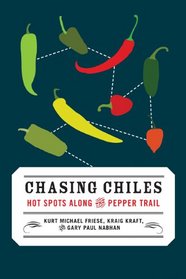Search -
Chasing Chiles: Hot Spots Along the Pepper Trail
Chasing Chiles Hot Spots Along the Pepper Trail
Author:
Chasing Chiles looks at both the future of place-based foods and the effects of climate change on agriculture through the lens of the chile pepper-from the farmers who cultivate this iconic crop to the cuisines and cultural traditions in which peppers play a huge role.Why chile peppers? Both a spice and a vegetable, chile peppers have captivated... more »
Author:
Chasing Chiles looks at both the future of place-based foods and the effects of climate change on agriculture through the lens of the chile pepper-from the farmers who cultivate this iconic crop to the cuisines and cultural traditions in which peppers play a huge role.Why chile peppers? Both a spice and a vegetable, chile peppers have captivated... more »
ISBN-13: 9781603582506
ISBN-10: 1603582509
Publication Date: 3/9/2011
Pages: 256
Rating: 1
ISBN-10: 1603582509
Publication Date: 3/9/2011
Pages: 256
Rating: 1
4 stars, based on 1 rating
Publisher: Chelsea Green Publishing
Book Type: Paperback
Members Wishing: 4
Reviews: Amazon | Write a Review
Book Type: Paperback
Members Wishing: 4
Reviews: Amazon | Write a Review
Genres:




